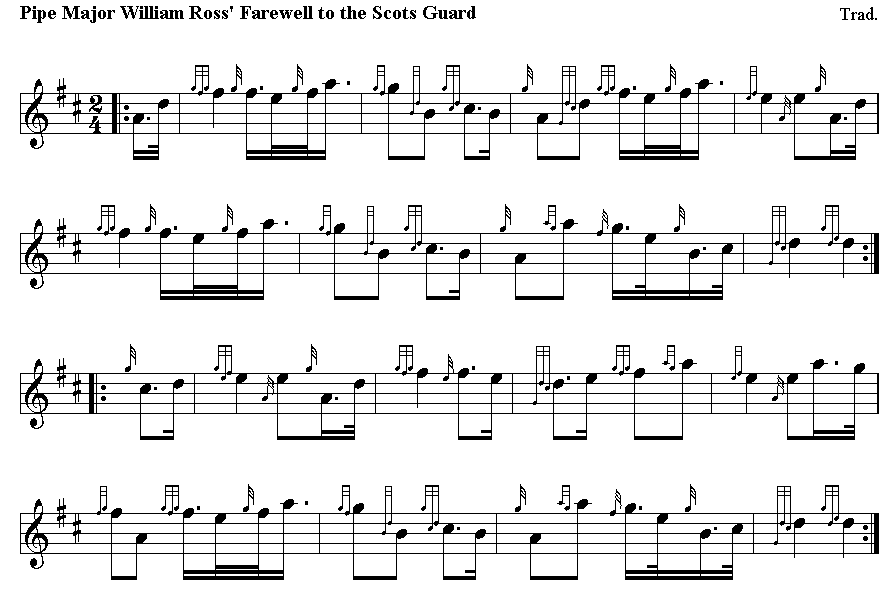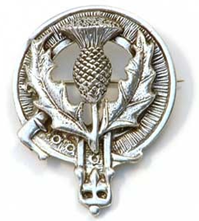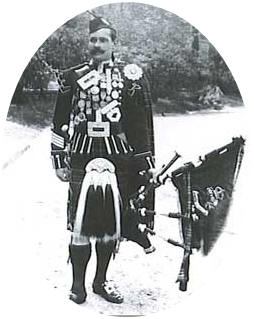Pipe Major
William
Ross, M.B.E.,
(1878-1966)
was born to
piping
parents in
Glenstrathfarrar
near Beauly
in
Inverness-shire
on June 14,
1878, and
was taught
primarily by
his mother,
Mary Collie.
He turned
his sights
on the army
quickly,
joining the
Scots Guards
at age 18 in
1896, thus
beginning an
military
association
that would
last for 60
years.
He was
decorated
with the 1st
Battalion in
the Boer War
in South
Africa from
1899-1902.
By then he
was already
composing
tunes, among
them The
Scots
Guards’
Farewell to
South
Africa.
In 1905 he
became
Pipe-Major
of the 2nd
Battalion,
while his
younger
brother
Alexander
would become
Pipe-Major
of the 1st
Battalion in
1911. He
served in
France
during the
Great War
until he was
invalided
from the
service in
1918 due to
rheumatism.
In 1919
he
secured
his
famous
post as
Instructor
at the
Army
School
of
Piping
at
Edinburgh
Castle,
a
position
at the
time
under
the
auspices
of the
Piobaireachd
Society.
This being only a half-time position, he was also able to accept a position as Piobaireachd Society instructor in the Highlands of Scotland, and also supplement his income with private pupils. In 1921 he was appointed Pipe-Major of the Lovat Scouts, a post he held until 1933.
This being only a half-time position, he was also able to accept a position as Piobaireachd Society instructor in the Highlands of Scotland, and also supplement his income with private pupils. In 1921 he was appointed Pipe-Major of the Lovat Scouts, a post he held until 1933.
By this
time his
competing
prowess
was the
stuff of
legend.
He won
the Gold
Medal at
Inverness
in 1904
and at
Oban in
1907. He
won
Clasps
to the
Inverness
Medal in
1905,
’06 and
’07,
1910,
’12,
’13, ’19
and ’28
– a
record
of eight
that
would
stand
for
decades,
untouched
even by
piobaireachd
great
John
MacDonald
of
Inverness.
He won a
total of
11
Former
Winners’
M/S/R
events
at Oban
and
Inverness.
This
competitive
record
easily
distinguishes
him as
the best
overall
competitor
of his
day.
He
was
a
tall
man
and
very
handsome
in
his
younger
days.
His
wife
Edith
(MacGregor)
was
equally
striking,
and
as
Dr.
William
Donaldson
writes
in
his
book
Pipers,
“They
used
to
turn
heads
in
the
Strand
as
they
walked
out,
she
dressed
in
the
highest
fashion
and
he
resplendent
in
the
full
No.
1’s
of a
pipe-major
in
the
Scots
Guards.” They
were
married
in
1903.
They
had
two
children:
a
son
William
who
died
young,
and
a
daughter
Cecily,
very
musical,
and
immortalized
in
Roderick
Campbell’s
superb
four-parted
reel,
Cecily
Ross.
Ross would hold his position at the Castle for nearly 40 years until his retirement in 1958, when he was succeeded by Pipe-Major John A. MacLellan. During this time he transformed the position into a high-profile one, training hundreds of pipers and being responsible for virtually all the premier players the army produced at this time, including Donald MacLeod and John A. MacLellan. His most famous private pupil was John D. Burgess, who won both Gold Medals at age 16 in 1950, and with whom Ross toured North America in 1952. He produced a long series of gramophone recordings and played frequently on the radio. His fame spread. Angus MacPherson of Invershin honoured him with a piobaireachd, Salute to Pipe-Major William Ross, and he was often referred to as “The World’s Pipe-Major,” a reputation he lived up to as more than just a piper.
Ross would hold his position at the Castle for nearly 40 years until his retirement in 1958, when he was succeeded by Pipe-Major John A. MacLellan. During this time he transformed the position into a high-profile one, training hundreds of pipers and being responsible for virtually all the premier players the army produced at this time, including Donald MacLeod and John A. MacLellan. His most famous private pupil was John D. Burgess, who won both Gold Medals at age 16 in 1950, and with whom Ross toured North America in 1952. He produced a long series of gramophone recordings and played frequently on the radio. His fame spread. Angus MacPherson of Invershin honoured him with a piobaireachd, Salute to Pipe-Major William Ross, and he was often referred to as “The World’s Pipe-Major,” a reputation he lived up to as more than just a piper.
His many compositions include some top-drawer tunes: the lilting 6/8 marches Leaving Port Askaig and Queen Elizabeth’s March, the haunting slow air MacRoberts’ Lament, the evergreen quick marches Corriechoillie’s 43rd Welcome to the Northern Meeting and Captain Norman Orr Ewing, the daunting and powerful competition march Brigadier General Ronald Cheape of Tiroran and the classic jig Center’s Bonnet.
He compiled five books of music between 1923 and 1950. They remain in print today and any pipers worth their salt turn first to these for competition pieces. More than any other publications, these set in firm print the gracing style evolved by the likes of John MacColl, G.S. McLennan, his cousin William McLennan and Ross himself. It is a style that is still in vogue – often gracenote-for-gracenote – on the competition platform today.
King George V awareded him the Royal Victorian Medal in 1910, and in 1945 King George VI invested him as a Member of the Order of the British Empire. While these were honours well deserved, a more distinctive one was the request from King George VI that an air composed by Pipe Major Ross and played in the hearing of the then King and Queen before it had been 'christened,' should be given the name 'Queen Elizabeth.'
His final years were dogged by ill health. He died on March 23, 1966 in Edinburgh and was buried beside his wife in Morningside Cemetery.
King George V awareded him the Royal Victorian Medal in 1910, and in 1945 King George VI invested him as a Member of the Order of the British Empire. While these were honours well deserved, a more distinctive one was the request from King George VI that an air composed by Pipe Major Ross and played in the hearing of the then King and Queen before it had been 'christened,' should be given the name 'Queen Elizabeth.'
His final years were dogged by ill health. He died on March 23, 1966 in Edinburgh and was buried beside his wife in Morningside Cemetery.



